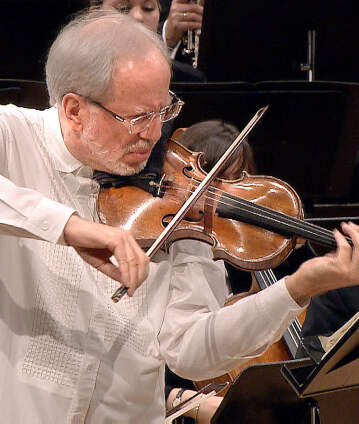Christian Thielemann and Gidon Kremer

After almost a decade, Gidon Kremer returned to the Berliner Philharmoniker with this concert from 2016. The programme included Sofia Gubaidulina’s violin concerto In tempus praesens, in which a spiritual and filigree solo part meets a powerful orchestral sound. Conductor and Bruckner specialist Christian Thielemann also presented the composer’s Mass in F minor, a monumental work clearly inspired by Beethoven’s Missa solemnis.
When Gidon Kremer launched Sofia Gubaidulina’s violin concerto Offertorium on 30 May 1981 during the Vienna Festival, the composer, who was born in 1931 in Chistopol, Tatarstan, was still virtually unknown: the Soviet composer’s association flatly declined her oeuvre, so at first her composing simply “ended up on the shelf”. In the West, the work, which quotes Bach’s Musical Offering, caused a stir even though no new techniques and systems are applied: “As an ideal, I regard a kind of relationship to both tradition and new compositional means in which the artist masters all the means – both the new and the traditional ones – but as if he were not paying attention to either.”
Almost 25 years after the successful premiere of the Offertorium, Sofia Gubaidulina wrote her second violin concerto entitled In tempus praesens, this time for Anne-Sophie Mutter. For this piece too, Johann Sebastian Bach’s music was the inspiration: from the introductory measures in the solo violin, which feel their way forward gingerly, the chromatic lines remind one of the cipher in sound: B-A-C-H. Thereafter the composer succeeds in wresting the most fantastic effects of colour out of the instruments – including when the sound of the solo violin combines, extremely ingeniously, with that of the flute, clarinet, harp, celesta and the high percussion, or when four solo violas, supported by the most varied of instrument combinations, form a sort of concertino. Gidon Kremer presents Gubaidulina’s concerto In tempus praesens at his Philharmonic guest appearance – with that extraordinary sound where, as the composer commented, all vital energy seems to focus on the strings played.
Following it, Christian Thielemann programmed Anton Bruckner’s Mass No. 3 in F minor. It was composed in the years 1867–68 and is his last and greatest mass composition; according to the composer, it is oriented towards Beethoven’s Missa solemnis and the two late masses by Franz Schubert. Still the cathedral organist in Linz, Bruckner wrote the work for the court orchestra in Vienna, which also provided sacred music at the imperial court. A little later he himself moved to Vienna to take office as the cathedral organist and to discharge his appointment as a teacher at the Conservatory. As the mass posed great difficulties to the court orchestra musicians, the premiere was delayed by four whole years, and took place conducted by the composer in the Church of St Augustine near the Hofburg in June 1872. It was a great success for Bruckner, and the work was soon incorporated into concert hall programmes.
© 2016 Berlin Phil Media GmbH
Related interviews
Artists
Our recommendations
- Christian Thielemann conducts choral works by Johannes Brahms
- Unfamiliar Bruckner with Christian Thielemann
- Christian Thielemann conducts Brahms’s “Deutsches Requiem”
- A Verdi evening with Christian Thielemann
- A Richard Strauss evening with Christian Thielemann, Renée Fleming and Thomas Hampson
- A Strauss evening with Christian Thielemann and Anja Kampe